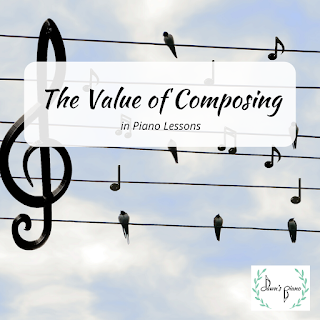The Value of Composing in Piano Lessons
One of my favorite things to do each year is revisit our Young Composers program during summertime lessons, and in today's post I'm outlining some of the reasons why I feel giving music students the chance to compose their own music is an incredibly valuable creative exercise.
Reinforces Music Fluency
We spend a lot of time in lessons learning to hear and see music from a musician's point of view. We learn to read notes, to hear intervals and chords, we identify the quality of our music with terms like 'major' and 'minor'. All of this works together to create music fluency. When we write music we get to reinforce some of these essential skills:
I am of the mindset that creativity isn't a 'have' or 'haven't' got it kind of skill, it's more like a muscle. If we exercise it, it grows stronger - if we don't, it can atrophy.
We spend a lot of time at the instrument learning music written by somebody else. And there are some truly amazing composers alive today, as well as in music history. We study them, we learn from them - it's all great. But for students who have strong creative muscles and are full of songs wanting to come out, playing other people's music all the time can get a little repetitive or even frustrating. Giving them a chance to put their songs out in the world can reinvigorate their creative interest as well as reinforce the value of what we can learn from those other composers. And for students who don't have strong creative inclinations in music, we can see this as a way of exercising that muscle so that they can learn a little more confidence and strength in their own ability to be creative.
Fosters Ownership of their Musical Journey
There's a sense of pride that comes with having created something, and for music students having a tangible piece of music they've created and can share goes a long way for having something extra special to be proud of. Writing music gives us a more direct emotional attachment to our musical journey and to what we are learning. It also reinforces a music student's identity as a 'musician' both in their own eyes as well as that of their family and community.
So, this summer, we'll be digging into composing again. And I am so looking forward to what we can create! The book of the finished compositions and an album of the recordings will be published on this blog at the end of our summer session.
Reinforces Music Fluency
We spend a lot of time in lessons learning to hear and see music from a musician's point of view. We learn to read notes, to hear intervals and chords, we identify the quality of our music with terms like 'major' and 'minor'. All of this works together to create music fluency. When we write music we get to reinforce some of these essential skills:
- Note Literacy - when we write or type up the notes for a composition, we're interacting with those notes from a new perspective that will help to remember them better in the future.
- Dynamics & Expressive Tools - especially for young musicians, expressive markings in the music can easily get overlooked when our focus is taken up with getting the right keys at the right time. Music is definitely an exercise in multi-tasking. But when students choose dynamics for their own piece, they tend to remember them. AND because they've experienced the perspective of the composer, they tend to pay attention to them better in their assigned pieces in the future.
- Repeats & ending systems - ending systems and different types of repeats are how we navigate a piece of music to play the right sections at the right time, but they can get complicated pretty quick for young students. Writing a piece that uses these as tools can go a long way to de-mystifying them in future songs.
I am of the mindset that creativity isn't a 'have' or 'haven't' got it kind of skill, it's more like a muscle. If we exercise it, it grows stronger - if we don't, it can atrophy.
We spend a lot of time at the instrument learning music written by somebody else. And there are some truly amazing composers alive today, as well as in music history. We study them, we learn from them - it's all great. But for students who have strong creative muscles and are full of songs wanting to come out, playing other people's music all the time can get a little repetitive or even frustrating. Giving them a chance to put their songs out in the world can reinvigorate their creative interest as well as reinforce the value of what we can learn from those other composers. And for students who don't have strong creative inclinations in music, we can see this as a way of exercising that muscle so that they can learn a little more confidence and strength in their own ability to be creative.
Fosters Ownership of their Musical Journey
There's a sense of pride that comes with having created something, and for music students having a tangible piece of music they've created and can share goes a long way for having something extra special to be proud of. Writing music gives us a more direct emotional attachment to our musical journey and to what we are learning. It also reinforces a music student's identity as a 'musician' both in their own eyes as well as that of their family and community.
So, this summer, we'll be digging into composing again. And I am so looking forward to what we can create! The book of the finished compositions and an album of the recordings will be published on this blog at the end of our summer session.
